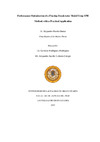Identificador persistente para citar o vincular este elemento:
https://accedacris.ulpgc.es/jspui/handle/10553/10363
| Campo DC | Valor | idioma |
|---|---|---|
| dc.contributor.advisor | Rodríguez Rodríguez, Germán | - |
| dc.contributor.advisor | Cabrera Crespo, Alejandro Jacobo | - |
| dc.contributor.author | Rueda Durán, Alejandro | - |
| dc.date.accessioned | 2013-07-02T05:00:08Z | - |
| dc.date.accessioned | 2018-05-15T10:47:15Z | - |
| dc.date.available | 2013-07-02T05:00:08Z | - |
| dc.date.available | 2018-05-15T10:47:15Z | - |
| dc.date.issued | 2013 | en_US |
| dc.identifier.uri | https://accedacris.ulpgc.es/handle/10553/10363 | - |
| dc.description | Máster en Oceanografía | en_US |
| dc.description.abstract | The use of a floating breakwater, as an environmentally friend structure, is suggested as a coastal protection structure for the EGSAM pier in Santa Marta Bay, Caribbean Colombian coast. A large number of floating breakwater structures existing in the literature are examined and compared to define the structure to be used in the studied case. The selection of the more adequate structure is mainly based on two aspects, their dimensions and efficiency, in terms of the wave energy transmission. The efficiency assessment, as a function of the incident wave period and the distance between the floating breakwater and the pier, has been carried out by means of the smoothed particle hydrodynamic (SPH) method, a free-mesh numerical method. Results reveal that SPH method properly simulates the interaction between water waves and a coastal protection structures. Nevertheless, 3D numerical experiments require considerable computational cost, whereas the use of 2D experiments alleviates these drawbacks but include unrealistic effects, mainly due to the presence of closed, non dissipative, boundaries. The proposed structure for the EGSAM pier reveals considerable advantages in contrast with conventional coastal protection structures, which must be evaluated in a wave channel, as part of the design process. | en_US |
| dc.format | application/pdf | es |
| dc.language | eng | en_US |
| dc.rights | by-nc-nd | es |
| dc.subject | 251007 Oceanografía física | en_US |
| dc.subject | 330511 Puertos | en_US |
| dc.subject.other | Floating Breakwater | en_US |
| dc.subject.other | Smoothed Particle Hydrodynamic | en_US |
| dc.subject.other | Waves and Coastal Structures | en_US |
| dc.title | Performance Optimization of a Floating Breakwater Model Using SPH Method, with a Practical Application | en_US |
| dc.type | info:eu-repo/semantics/masterThesis | en_US |
| dc.type | MasterThesis | en_US |
| dc.bustreaming | 20376 | es |
| dc.compliance.driver | 1 | es |
| dc.contributor.departamento | Física | en_US |
| dc.contributor.facultad | Facultad de Ciencias del Mar | en_US |
| dc.identifier.absysnet | 683667 | es |
| dc.identifier.crisid | - | - |
| dc.investigacion | Ciencias | en_US |
| dc.rights.accessrights | info:eu-repo/semantics/openAccess | es |
| dc.type2 | Trabajo final de máster | en_US |
| dc.description.notas | Máster en Oceanografía ; 2013 | en_US |
| dc.utils.revision | Sí | en_US |
| dc.identifier.ulpgc | Sí | en_US |
| dc.contributor.buulpgc | BU-BAS | en_US |
| item.fulltext | Con texto completo | - |
| item.grantfulltext | open | - |
| crisitem.advisor.dept | GIR IUNAT: Física marina y teledetección aplicada | - |
| crisitem.advisor.dept | IU de Estudios Ambientales y Recursos Naturales | - |
| crisitem.advisor.dept | Departamento de Física | - |
| Colección: | Trabajo final de máster | |
Visitas
96
actualizado el 30-nov-2024
Descargas
368
actualizado el 30-nov-2024
Google ScholarTM
Verifica
Comparte
Exporta metadatos
Los elementos en ULPGC accedaCRIS están protegidos por derechos de autor con todos los derechos reservados, a menos que se indique lo contrario.
